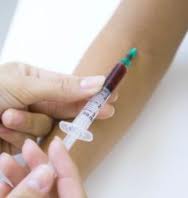 The New Jersey Public Health and Environmental Laboratories (PHEL) began testing blood samples late last week for Zika, dengue and chikungunya viruses, all caused by mosquito-transmitted viruses and found in a number of countries worldwide. The New Jersey Public Health and Environmental Laboratories (PHEL), located on the grounds of the State Police headquarters in West Trenton, is among a select group of state and local public health labs outside the federal Centers for Disease Control and Prevention (CDC) that is prepared to test for Zika.
The New Jersey Public Health and Environmental Laboratories (PHEL) began testing blood samples late last week for Zika, dengue and chikungunya viruses, all caused by mosquito-transmitted viruses and found in a number of countries worldwide. The New Jersey Public Health and Environmental Laboratories (PHEL), located on the grounds of the State Police headquarters in West Trenton, is among a select group of state and local public health labs outside the federal Centers for Disease Control and Prevention (CDC) that is prepared to test for Zika.
“The ability to test residents for Zika and similar viruses will further enhance New Jersey’s preparedness and response to this evolving health emergency unfolding in the Caribbean and Central and South Americas,” Acting Health Commissioner Cathleen Bennett said. “We continue working every day to prevent local transmission as mosquito season approaches in New Jersey.”
The New Jersey PHEL can perform three diagnostic, CDC-developed Zika tests to detect the virus and differentiate it from similar illnesses. Zika testing over the past three months has been conducted at the Wadsworth Center, the New York State Health Department laboratory, and the CDC. The Public Health Laboratory will continue to collaborate with the CDC and Wadsworth to assure a smooth transition and maintain current laboratory information regarding viral testing.
Each year, the PHEL conducts more than 5 million tests for a wide range of diseases and chemical contaminants on a variety of environmental and clinical samples. PHEL data is generated in close collaboration with epidemiologists, local health officials and multiple state agencies, federal partners and healthcare providers who use the laboratory information to protect the public.
To date, there have been no reports of Zika spread by mosquitoes in the continental United States, but more than 500 cases have been reported in travelers, including 15 in New Jersey. The Department’s #ZapZika public awareness campaign remains ongoing to educate pregnant women, those thinking about becoming pregnant, their partners and travelers about the risk of Zika to them and their unborn children. Acting Commissioner Bennett and the Department’s top doctors — including Deputy Commissioner Dr. Arturo Brito, a bilingual pediatrician — continue to share information with pregnant women in health centers and hospitals, physician groups, college students, professional medical societies and public health officials.
The Department and the New Jersey Poison Information and Education System (NJPIES) have partnered to open a call line for providers and the public available at 1-800-962-1253. The Department has also hosted a series of six conference calls with physicians, public health and health care professionals, and maternal and child health advocates to review CDC guidance. More than 350 local health officials also participated in a training webinar and received tool kits to use in their communities.
Radio public service announcements are being broadcast in English and Spanish, and NJ Transit bus advertising is displayed encouraging pregnant women to avoid travel to Zika-affected countries and travelers to prevent mosquito bites by using insect repellent and wearing long sleeves and pants. The Department shares CDC information, guidance and alerts via the New Jersey Local Information Network and Communication Systems (LINCS) alert system and posts those materials on New Jersey’s Zika website, which contains resources in English, Spanish, Creole and Portuguese. Information is also shared on the Department’s Twitter and Facebook pages daily using the hashtag #ZapZika for people to stay connected and updated.
The majority of individuals who get Zika do not develop symptoms. For those who do, symptoms tend to be mild. There is no vaccine or antiviral medication to treat Zika. Mosquito bites remain the primary way Zika is transmitted. Though rare, the CDC has cautioned that sexual transmission of Zika has been reported after travel to impacted countries. When traveling to countries where viruses have been reported, the best way to protect yourself is to use insect repellent, wear long sleeves and pants, and stay in places with air conditioning or that use window and door screens.
The American Red Cross has recommended that asymptomatic blood donors who have traveled to Mexico, the Caribbean, or Central or South Americas postpone blood donations until 28 days after returning to the U.S. The CDC maintains a list of active transmission areas available at http://www.cdc.gov/zika/geo/index.html.
Physicians and local health officials should contact the Department’s Communicable Disease Service at 609-826-5964 if they believe they have a patient who meets testing criteria. Physicians may contact the PHEL for laboratory questions related to Zika at [email protected]. Members of the public should contact their physician or call 1-800-962-1253, the NJPIES Zika call line, for questions and more information.
For more information, visit www.nj.gov/health/cd/zika/ or www.cdc.gov/zika/.
[TLS]
